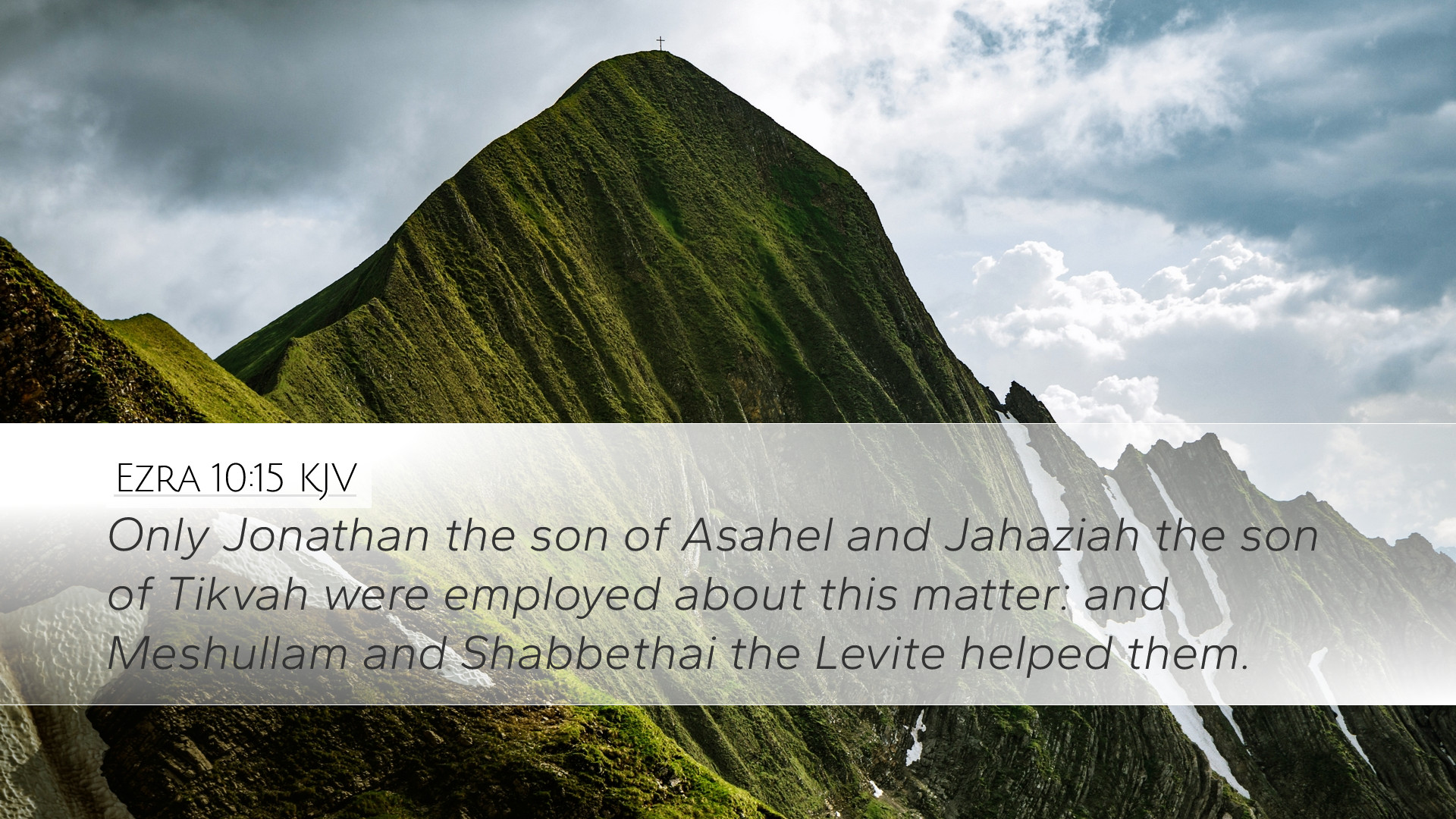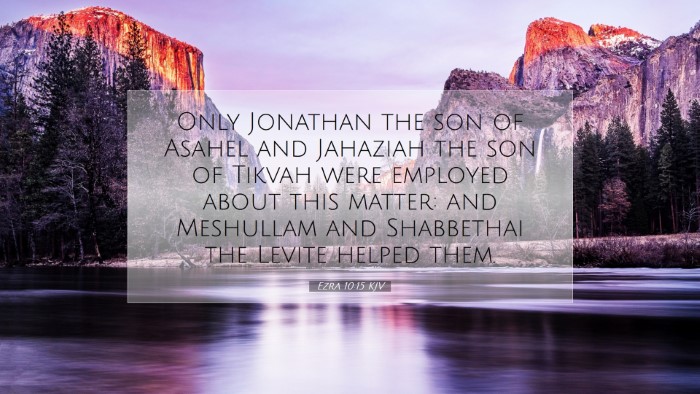Commentary on Ezra 10:15
Ezra 10:15 reads: "Only Jonathan the son of Asahel and Jahzeiah the son of Tikvah opposed this, and Meshullam and Shabbethai the Levite helped them." This verse encapsulates the moment of significant decision-making within the Israelite community upon their return from exile, specifically concerning the matter of intermarriage with foreign peoples.
Contextual Background
The return from Babylonian exile brought with it a renewed commitment to the Law of Moses. Ezra, as a priest and scribe, leads the charge to restore true worship and obedience to God's commandments. The context of this verse lies in the profound spiritual and ethical implications surrounding mixed marriages, which threatened the purity of the Jewish faith.
Verse Analysis
The two individuals named, Jonathan son of Asahel and Jahzeiah son of Tikvah, stand as the dissenting voices to the consensus that Ezra had shaped concerning divorce from foreign wives. Their opposition is noteworthy and warrants exploration.
Opposition to Reform
In a time of necessary reformation, opposition often arises. As Matthew Henry points out, Jonathan and Jahzeiah's stance highlights the internal conflict within the community. They symbolize the reluctance that often accompanies spiritual renewal. Their resistance could stem from several factors, including personal relationships and a fear of disrupting familial ties.
The Role of Levites
Meshullam and Shabbethai, identified as Levites, are significant allies to the dissenters. The Levites held a pivotal role in worship and maintained the covenantal relationship between God and Israel. Albert Barnes emphasizes that their involvement indicates a level of support for the dissenters' perspective, which implies that even within the Temple services, divergent views on the Law's applications existed.
Theological Implications
This verse illustrates a critical moment of communal decision-making, raising theological questions about leadership, purity, and the implications of the covenant. Adam Clarke elaborates on the necessity for spiritual leaders to address moral and ethical issues decisively. The unity of the people is contingent upon their adherence to divine statutes, which underscores the challenge faced by Ezra as he attempted to steer Israel toward fidelity to God.
Purity vs. Inclusivity
At the heart of the opposing views is a tension between the call for purity in worship and the natural human inclination toward inclusivity. The notion of remaining separate from foreign influences is often echoed in Scripture, reminding believers of the need for distinctiveness in their faith. This contention is not merely about geographical or cultural boundaries but about maintaining a heart that remains true to God amidst outside influences.
Lessons for Modern Believers
The narrative in Ezra 10:15 serves as a profound reminder for contemporary believers and leaders. The challenges faced by Ezra and the remnant provide instructive lessons:
- Leadership in Times of Conflict: Leaders are often called to mediate between differing perspectives within their communities, seeking God's wisdom to guide them in difficult decisions.
- Understanding Resistance: Acknowledging and understanding opposition, rather than dismissing it, allows for a more cohesive community that values the voices of its members.
- Maintaining Spiritual Purity: The call for spiritual purity is as relevant today as it was in Ezra's time, inviting all believers to examine the influences shaping their faith.
- Community and Accountability: The necessity of accountability within faith communities remains crucial; mutual encouragement helps believers uphold their commitments to God.
Conclusion
As Ezra navigates the complexities of restoring a people to their covenantal identity, Ezra 10:15 highlights the human dimensions of spiritual reform. The tensions between adherence to the Law and personal relationships remind us that faith is lived out in community. The Lord calls His people not only to obey but to love—recognizing the challenge of pursuing both in harmony.
Reflection Questions
- How can modern churches navigate differing opinions on ethical issues while maintaining unity?
- What does this passage teach about the balance between cultural engagement and spiritual fidelity?
- In what ways can the church today uphold its commitment to purity without closing off to the world?


